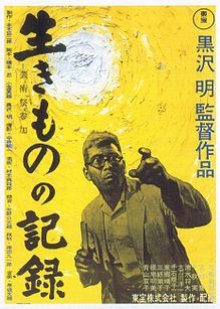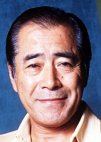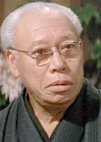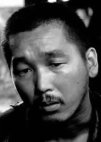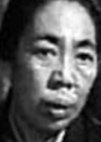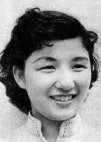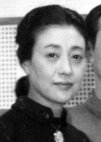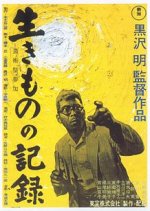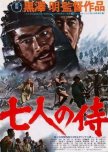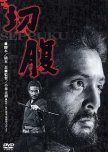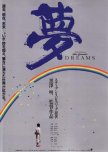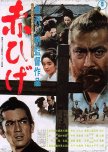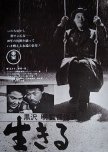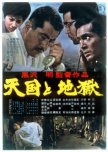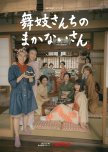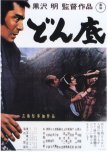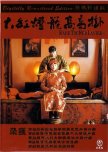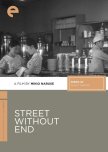- Română
- English
- magyar / magyar nyelv
- dansk
- Titlu Nativ: 生きものの記録
- De asemenea cunoscut ca și: Ikimono no kiroku , Record of a Living Being , What the Birds Knew
- Scenarist și Regizor: Kurosawa Akira
- Scenarist: Oguni Hideo, Hashimoto Shinobu
- Genuri: Dramă
Cast și credite
- Mifune Toshiro Rol Principal
- Shimura TakashiDr. HaradaRolul de Sprijin
- Chiaki MinoruNakajima JiroRolul de Sprijin
- Miyoshi EikoNakajima ToyoRolul de Sprijin
- Aoyama KyokoNakajima SueRolul de Sprijin
- Togo HarukoNakajima YoshiRolul de Sprijin
Recenzie

Această recenzie poate conține spoilere
"Everybody has to die, but I won't be murdered!"
I Live in Fear dealt with the fear of atomic bombs and the dissolution of the patriarchal household giving all new meaning to the term nuclear family. It asked the question, "who is more insane---the one who fears a real threat and overreacts or the ones who know it exists and ignore it?"It would be difficult to overstate the fear and paranoia of nuclear war and nuclear testing in 1955, especially 1955 Japan. This film was made only ten years after the atomic bombs had been dropped on Hiroshima and Nagasaki. The Korean War which had left that peninsula carved up had ended two years before. WWIII had narrowly been averted on their front doorstep. In some countries bomb shelters were dug in backyards and duck and cover drills in school were a reality due to the Cold War and nuclear bomb proliferation. Not to mention, a giant irradiated lizard named Gojira had trashed Tokyo only the year before on screen. Living in the shadow of potential world destruction was a new fear that was being dealt with in books, movies, articles, coffee klatches, and political arenas. Kurosawa brought forth his own talking point in this film.
Nakajima Kiichi, the patriarch of his large family, can no longer live "with the fear of nuclear war or being down wind of nuclear testing. After a failed attempt at creating a large bunker in southern Japan he has determined the only safe place for his family is to move them to Brazil. His family resents his unilateral decision for them, but even more the money he has spent. If he sells the foundry he owns they will have to start over and actually have to go to work and not live off of their father. Kiichi is doing what he sees is best for his family out of his concern for them. Most of his family is more concerned with his financial viability thus ensuring theirs.
The family takes him to court and tries to have him declared incompetent. A judge, a member of the bar, and the local dentist-Dr. Harada, are tasked with mediating the case. Kiichi has been found to be psychiatrically sound. Ultimately, two of the three determine Kiichi's response is excessive and the greater kindness is to stop him from using his money to attempt to emigrate his family to Brazil. Harada, however, has his doubts. Everyone he knows fears nuclear war, but has found a different way of dealing with it than Kiichi. But does that make Kiichi's excessive response wrong?
When Kiichi is unable to buy the land in Brazil, his mental stability begins to crack. He meets with the family and begs them to go to Brazil, bowing deeply causing his wife to capitulate and ask the children to follow him. The children refuse his "unwelcome kindness" and Kiichi collapses. No one seems particularly concerned about him, instead they are like sharks smelling blood in the water. Everyone is concerned where they stand in the will, especially his mistresses and illegitimate children. They only need the foundry, not their father. This causes an explosion in his mind and it further cracks, in a moment of last desperation, Kiichi burns the foundry to the ground. His workers confront him about their loss of livelihood. He tells them he'll find a way to take them all to Brazil with him. Once again, he's faced with people unwilling to leave their homes to avoid a theoretical danger and instead willing to live in uncertainty. Kiichi's son yells at his father that there is no safe place on Earth, no place that will remain untouched if nuclear war begins, not even Brazil.
Kiichi suffers a mental breakdown which in the end takes him to a safer place. Visiting the asylum, Harada witnesses the change in the smiling older man. He's left wondering if he'd done the right thing. After all, is it really madness to fear a real threat or madness to pretend it doesn't exist?
Mifune Toshiro as the 70-year-old Kiichi gives his usual powerful performance but is hampered by the makeup created to make him look twice his age. I finally had to tell myself this was like a stage play to accept the awkward look. This was not an easy person to play, Kiichi is a complicated character and not always likeable. He loves his family yet also thinks he can tell them what to do, never asking their opinion on uprooting their lives to move to a foreign land. Cantankerous at times, yet also gentle, shown lovingly rocking his grandson to sleep. Lightning and thunder trigger a frightened response reminiscent of PTSD. His fear is real especially for someone who lived during the time when nuclear bombs were dropped on Japan. His response was to run from the danger instead of ignoring it knowing that one citizen could do little against the world powers building the insane weaponry as fast as they could.
As much as the film was an indictment on the nuclear age, it was also an indictment on the modern post war nuclear family. Kiichi's children were far more concerned about their standard of living provided by their father instead of his physical and mental health. While the children had some valid concerns about their father's actions, ultimately, it was his property and money, not theirs. They were content to feed off of his efforts. The greatest toxicity Kiichi was exposed to came from his own flesh and blood.
Decades after this film was made we still face the same decision Kiichi had to make. With enough weapons of mass destruction to wipe life off the surface of the planet, we each have to decide if we will live in fear or accept that the fear is the price we pay for the times we are living in. And that with any luck some day our collective wisdom may catch up with the terrors we have created.
2/10/23
Considerați utilă această recenzie?
Recomandări
There have been no recommendations submitted. Be the first and add one.

